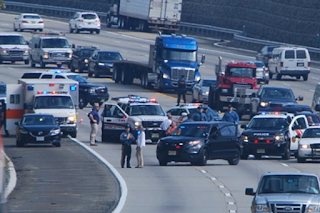How can I respond?
Suicide is America’s tenth leading cause of death, taking 45,000 lives each year. The crisis was accentuated when public figures killed themselves as the Center for Disease Control and Prevention (CDC) released recent data showing steady increases. This moved me to join another public discussion to determine whether it’s possible to know when someone’s suicidal. If so, and assuming life is the healthiest choice, it’s critical to know how to intervene and help.
Driving while listening to a scene from Unbroken, Laura Hillenbrand’s book about Louis Zamperini, inspired me. A giant, compassionate, Japanese war prison guard protected Zamperini from tortuous guards. He whispered to Louis: “You Christian, I Christian.” As I thought about stopping bullies, an eighteen-wheeler on my right lost control.
It was mid-morning, mid-September. Three packed highway lanes cruised at maximum speed. Brakes pumped and the truck skipped into the service lane. A parked Jeep forced the truck back at me. Everything slowed, but my heart. A boot rolled in front of me. Beyond it rolled a person. Nothing separated us. I parked and yelled, “You ok?”
A young man wearing a new suit and tie lay in front of me, I hoped, alive. His head doused hope. I prayed and covered his disfigurement. Traffic was directed to lanes on both sides of the victim. A 911 operator recorded my report.
A police officer arrived. He said I prevented a pileup. We funneled the traffic to the inner lane (as pictured). More help arrived. He asked if I’d seen anything like this. Never. He claimed the impact sucked the victim from his shoe.
A relative ended her life this way. If our paths crossed prior and they displayed common suicidal signs like withdrawing; giving away possessions; speaking of helplessness or powerlessness or being wronged; acting recklessly and other changes, (Please see Suicide.org.) I could have intervened and been present; listened without passing judgment or giving advice, sat with them as they dialed a suicide prevention line, or joined them to an emergency room and diverted them from spiraling.
They might envision positive outlooks with hopeful expectations in collaborative communities. When someone is valued and feels empowered to control their destiny, they choose to live.
It was too late to share appropriate responses like: “I’m here for you.” “You’re not alone.” “You are important to me.” “We are here to see one another through.” “When this is over, I’ll be here and so will you.” “I can’t understand your feelings, but I offer my compassion.” “I’m not leaving you.” “You are loved.” “I’m sorry you’re in so much pain.” “I am taking care of myself so you won’t worry your pain may hurt me.”
It was too late to ask them directly about their suicidal thoughts. It’s important to realize it won’t encourage them to act by asking; “Are you thinking of killing yourself?” “Have you ever attempted to kill yourself?” “When you say (fill in the blank), do you mean you’re thinking of killing yourself?” It’s important to not be afraid to be clear and direct.
A distraught man appeared who claimed the victim walked into his moving truck. We spoke. He feared being deported or jailed or worse. We hugged. He was inconsolable; shaking, crying, and stating he loved his family, his job, and America. “By law, he has to submit a blood test,” said the officer. If positive, he’d lose everything. No charges were filed. He kept his job.
The victim was thirty seven with a wife and a baby girl. What triggered this? Mental Illness? Depression? Trauma? Grief? Anger? Pain? Guilt? Shame? Failed expectations? Feeling trapped alone or stuck on an island? Treated poorly? Feeling controlled and powerless?
It was too late for me to share I experienced childhood traumas causing many to end their lives early with accidents, substance abuse, or suicide. Help and Grace saved me and are available to all. Darkness keeps a person from seeing the truth and sensing efficacy with self-awareness.
People learn to be happy. Happy folks are light on themselves. They realize life is short, yet a gift. They contribute to worthy causes, apply their special talents, and make meaningful differences in others. In success or failure, they tend not to overreact.
It was too late for me to share claims from survivors who attempted suicide by jumping from the Golden Gate Bridge. After jumping or letting go of the rail, they sensed regret and yearned to live! May peace and love Grace you and your family so you may fulfill your reasons for living.
If you or someone you know needs help, please call:
The National Suicide Prevention Lifeline: 1-800-273-TALK (8255).
The Samaritans Listening Line: 1 (800) 365 – 4044.
These confidential lines provide trained staff and volunteers available around the clock.




Comments